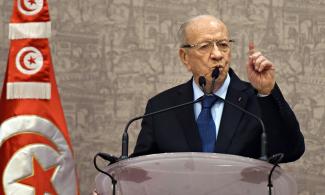
But Tunisia’s success so far confirms that democracy and Islam are in no way a contradiction. It is an example that should, with time, inspire others in the region. As such, Tunisia deserves strong financial assistance from those in the west that claim they favour democracy.
Four years ago, the death of a young street vendor sparked a popular uprising that led to the overthrow of the Tunisia’s dictator, Zine al-Abidine Ben Ali. Today, although many challenges still lie ahead, Tunisia offers the closest thing to a success story in the aftermath of the 2011 Arab spring. Indeed, the country where those momentous changes all began remains the country that offers the greatest hopes of a stabilised democracy in the Arab Muslim world.

Tunisia stands out as an exception in the region. Its political evolution stands in stark contrast to many of the region’s tragic turmoils: Egypt’s return to military authoritarianism, Syria’s civil-war slaughter-house, and Libya’s utter chaos. For the first time in its history, Tunisia has freely elected its president – the 88-year-old former speaker of parliament, Beji Caid Essebsi. This vote completed an electoral cycle that has harnessed the peaceful emergence of a new post-revolutionary democratic order in this 11-million strong nation.
Some critics have balked at Mr Essebsi’s profile: an old guard politician, associated with the fallen Ben Ali regime. But it is hard to deny that Tunisia offers a rare source of optimism in the post-2011 Arab world. For one thing, it has avoided the dreaded scenario of “one man, one vote … but just once”. Indeed, whatever their earlier mistakes, the Islamists of the Ennahda movement that came to power in 2011 accepted their defeat at the ballot, allowing genuine political alternation. In Egypt, by contrast, a violent military coup in 2013 ended the Islamists’ rule.
Some of the reasons for Tunisia’s democratic exceptionalism trace back deep into the nation’s history: 19th-century reforms had introduced a constitutional order, and the notion of separation between the state and religion. Habib Bourguiba’s post-independence presidency (from 1959 to 1987) left an important legacy of public education, social reform and female emancipation. In many ways, Tunisia’s 2011 revolution carried the seeds of its own success: Islamist fundamentalists played no role, the army came down on the side of peaceful change, and there was a strong civil service and middle class to build on. The role of Tunisian women in keeping militant Islamism at bay has been essential. Being smaller and less strategically positioned than Egypt may also have protected it from disruption from external powers.
None of this is to deny that there are clouds on the horizon. Tunisia’s new president may be a respected and experienced moderate, but he will need a government capable of solving deep economic problems, including a north-south regional divide. He will have to manage relations with neighbours in a volatile region where there is much anxiety about jihadi spillover from Libya and Syria.
But Tunisia’s success so far confirms that democracy and Islam are in no way a contradiction. It is an example that should, with time, inspire others in the region. As such, Tunisia deserves strong financial assistance from those in the west that claim they favour democracy.